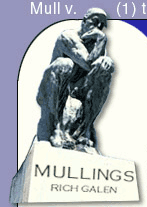








|

|

Grinding It Out
 Wednesday, March 8, 2000
Wednesday, March 8, 2000
From Austin, Texas
Mullings has covered Super Tuesday from California and Texas as
a cooperative effort of Mullings and
Voter.com.
________________________________________________________________
From Austin, Texas
In the end - which is where we are now - the Republican campaign of George W. Bush and the Democratic campaign of Al Gore had something in common: They both ground it out.
Six months ago Al Gore was in such bad shape, retiring New York Senator Daniel Patrick Moynihan endorsed Bill Bradley because Gore had "no chance of winning."
Gore unloaded a bunch of overhead, moved the campaign out of Washington, changed his wardrobe, slimmed down, perked up, fought back, and lashed out. By the time Bradley realized what had happened to him he was qualified to write the sequel to that famous political how-to book: "The Scholar as a Successful Presidential Candidate" by Adlai Stevenson.
Political analyst Charlie Cook said Gore's win was "surgical in its efficiency" once they got it organized.
George W. Bush was going to be crowned without having to fight at all. He hit the canvas so hard in New Hampshire he almost went out for the count. He was saved by the bell in Delaware, got away with some low blows in South Carolina, barely staggered though the Michigan round, then gathered himself well enough to win on an impressive TKO on Super Tuesday.
For his part, John McCain came out of nowhere as a one-issue candidate: Campaign finance reform. I, along with many others, said that one-issue campaigns do not win Presidential nominations unless that issue is war or peace.
I, along with many others, were very, very close to being very, very wrong.
The Gore and the Bush campaigns each had enormous advantages over their opponents. Gore had the power and prestige of the Vice Presidency. There is something to be said for Air Force II pulling up for a campaign stop with cameras rolling. Bush had the early, astounding, fundraising success which provided him with the ability to withstand the two big losses in New Hampshire and Michigan politically, without the additional weight of worrying about their effects on fundraising.
Senator McCain's back was constantly against the wall. He HAD to win New Hampshire. He did. After he lost South Carolina, McCain HAD to win Michigan. He did. After he lost Virginia, North Dakota, and Washington McCain HAD to win in a lot of places last night. He won in a few places. It was not enough.
Are both Gore and Bush better campaigners because of these races? Yes. Gore has demonstrated an animation no one believed he possessed. Bush can legitimately say there was no coronation. He had to earn his victory and by so doing showed he can beat a very tough opponent.
Both campaigns found the strength to shake off adversity and use their enormous power and reach to overwhelm their opponents.
What's ahead? Plenty of focus groups. Plenty of fund raising. Plenty of attention paid to House and Senate races which had not been able to register in the public eye due to the glare of the Presidential campaigns.
It is this process of selecting a President, as much as any other, which defines us as a country. We do this every four years. In good economic times and bad. During war and peace. When there is social unrest and when there is social calm. Almost every time it works very well.
Other nations watch this process and are amazed it works at all.
-- END --
Home | Secret Decoder Ring | Past Issues | Email Rich | Rich Who?
Copyright �2000 Richard A. Galen | Site design by Campaign Solutions.
|
|


